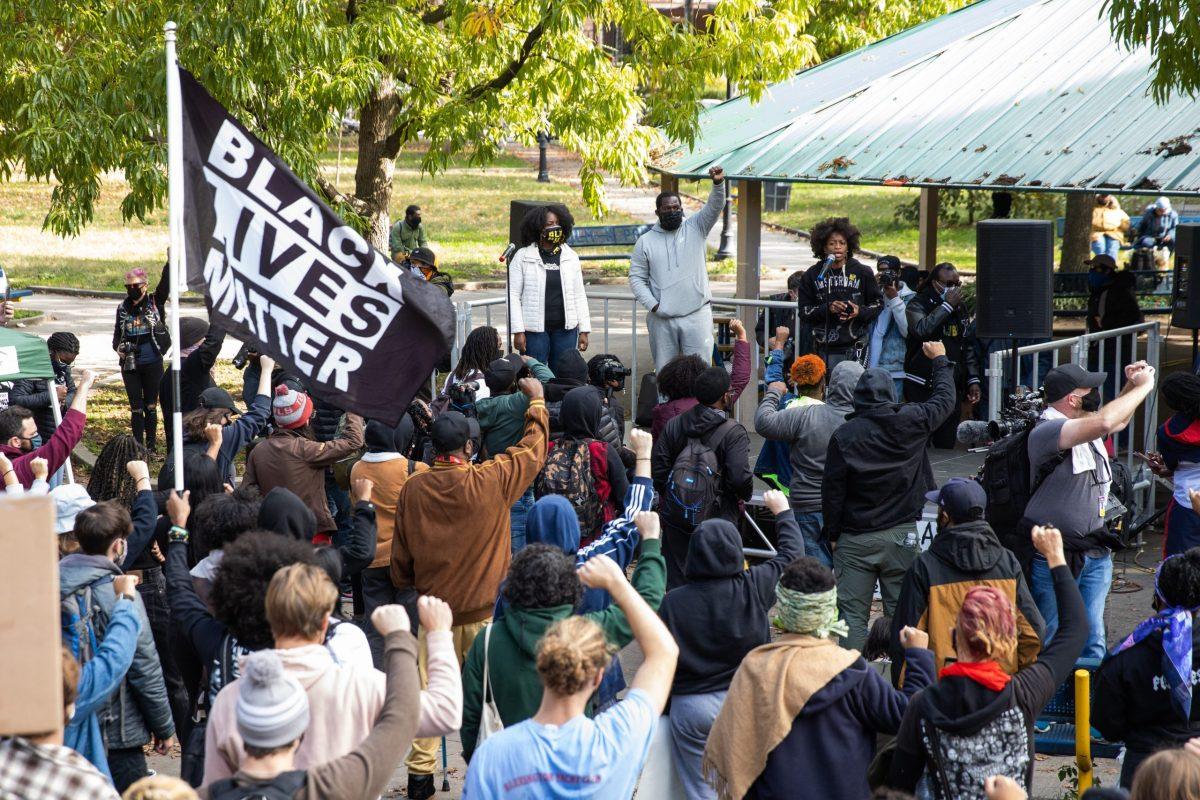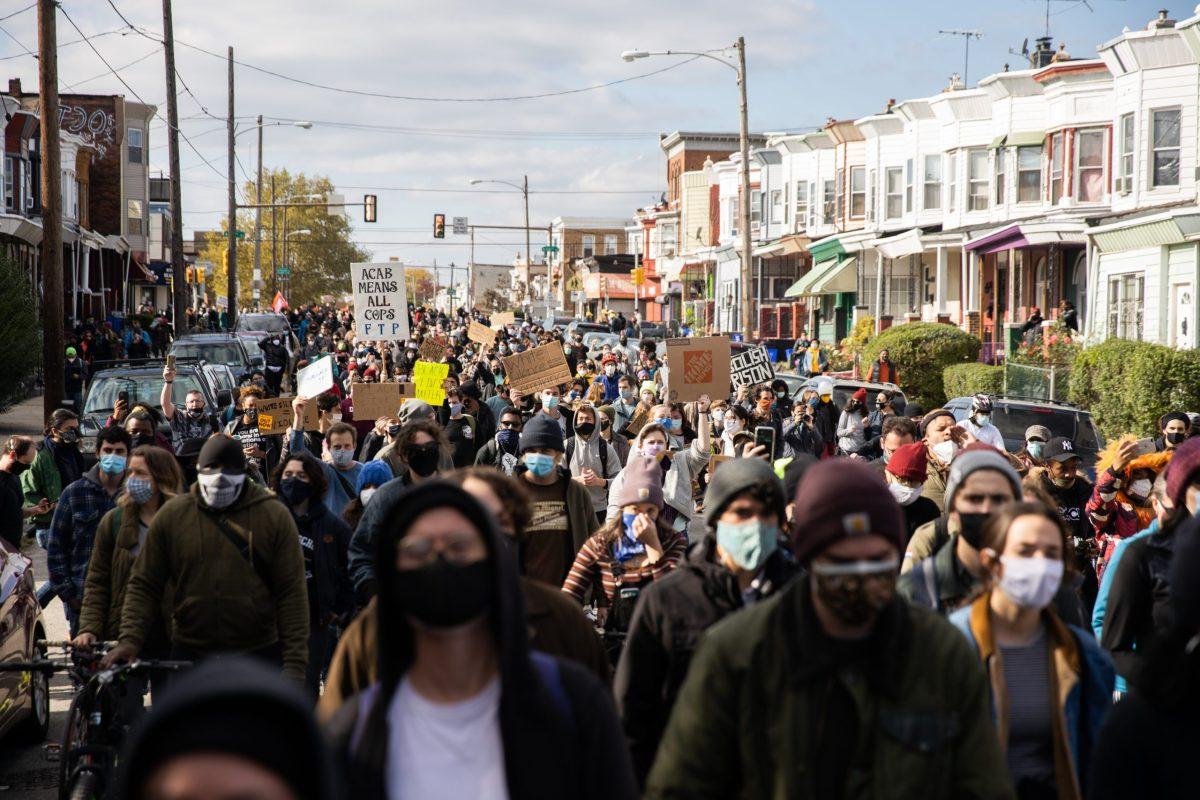Two days after the Oct. 26 killing of Walter Wallace Jr. by Philadelphia police while Wallace was experiencing a mental health crisis, a group of St. Joe’s students and faculty organized a gathering on Villiger Lawn to speak out against racial injustice.
The group advertised the event on various St. Joe’s-affiliated social media accounts, including #BeCivil SJU, SJU Greek Life and Campus Ministry.
According to the posts, following the campus gathering on Oct. 31, community members were invited to attend a protest in West Philadelphia, organized by Until Freedom, a social justice organization, and Black Philly Radical Collective, a group composed of different Philadelphia organizations.
Caren Teague ’23 said students were under the impression that the initial event would be similar to a student-led protest over the summer in response to the killing of George Floyd.
“I expected it to be outdoors, maybe also because I participated in the one that we did for George Floyd,” Teague said. “I expected it to be somewhat similar to that.”
On Oct. 29, one day after the event was announced, the #BeCivil campaign shared in an Instagram story that transportation in university vehicles would no longer be provided to the Until Freedom protest. Students were also advised to “attend at your own risk” and to direct “all questions to university administrators.”
The university announced a revised event, led by faculty and administrators, titled “SJU Response to Justice for Walter Wallace Jr.” The event was also moved indoors, to the university Chapel, where, because of COVID-19 restrictions, only 30 participants were allowed to register for in-person attendance. Others were invited to participate over Zoom.
Nicole Stokes, Ph.D., associate provost and director of Diversity, Equity and Inclusion, said “all constituents involved” tried to make the event similar to the walk of solidarity over the summer but were limited by “variables outside of the university’s control.”
“The city implementing the curfew in the middle of the week, and [there were] also some concerns around security and COVID-19 cases,” Nicole Stokes said. “The decision was made for us to scale it down a bit and to have faculty and staff support.”
About 19 people attended the Chapel event in person, in addition to six speakers.
In order to participate, students were required to have their speeches read by faculty before the event, according to Teague, the only student who spoke at the event.
“Students weren’t able to speak out uncensored,” Teague said in an interview with The Hawk. “I had to send in a copy of whatever I was reading. As a Black person on this campus, it can get really hard to breathe. I don’t know how else to describe [it]. You got to feel like you have to code switch and be this other person.”
In Teague’s remarks, she spoke about the lingering effects of Wallace’s killing on the Black community.
“At the end of the night, we know our problems, and our color, but I have to sleep in this skin,” Teague said during the event. “I can’t just put down my identity.”
Shortly after the original event was first announced on social media, some parents in the Facebook group “SJU Parent to Parent Connection” began criticizing what they saw as the university’s endorsement of the event on campus as well as the off-campus protest that was to follow.
“They can’t go to parties, or have people in their dorm rooms without the threat of being kicked off campus…how is attending a rally with 1000’s [sic] of people okay?” one parent commented, alongside a screen-shot of the flyer from the #BeCivil Instagram account. “Is everyone who attends the rally going to be required to quarantine for 14 days afterward?”
Cheryl McConnell, Ph.D., provost and vice president for Academic Affairs, said in her remarks at the Oct. 31 event that while she understood why some people wanted to protest, students planning to attend the march in West Philadelphia should be mindful of their safety.
According to the National Bureau of Economic Research, which published a working paper in late August based on analysis of data from various public health agencies, there is “no evidence that urban protests reignited COVID-19 case or death growth after more than five weeks following the onset of protests.”
At least two dozen St. Joe’s students and faculty attended the protest in West Phildelphia, near 61st and Locust Street where Wallace was killed. According to WHYY, Philadelphia’s public radio station, over 1,000 people marched through the streets as part of the protest, ending at Malcolm X Park where organizers gave speeches.
Taylor Stokes ’22, secretary of inclusion equity of the University Student Senate, who is from West Philadelphia, participated in the march in her home neighborhood, wrote in a text message to The Hawk that she decided to focus her energy on the Until Freedom protest after the change in plans for the St. Joe’s event.
“All we want is a space where faculty and students can mourn and speak out about their feelings,” Taylor Stokes wrote. “I really wanted an opportunity for the entire university to gather in the community we occupy, in the community we claim so heavily, yet when our community is hurt, we do things in our own bubble.”
Stephanie Zellner ’22, co-president of SJUPride, who also attended the protest in West Philadelphia, said it is important for other white students at St. Joe’s like her to support the Black community.
“At the end of the day, the [LGBTQIA+ community] wouldn’t have rights if it wasn’t for a trans Black woman like Marsha P. Johnson,” Zellner said. “I am willing to stand in solidarity with any community that’s hurting.”
Johnson was a prominent figure in the Stonewall uprising, a key moment in the LGBT movement during the 1960s.
Teague also encouraged students to engage in more conversation about white privilege on and off of St. Joe’s campus.
“I would want [students] to find that middle ground where we can all agree that we’re humans and we deserve human dignity and respect,” Teague said.
Taylor Stokes said the false narrative of violent protests for racial justice in Philadelphia could be changed if more students interacted with the surrounding community.
“I wish that more people from SJU came and were able to see the false narrative they may have about West Philadelphia in how strong of a community we are,” Taylor Stokes said. “We stand with each other, we cry with each other, we uplift each other, and we march with one another and that’s the West Philadelphia I know and love.”


















































